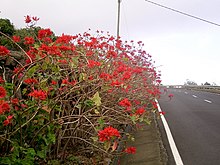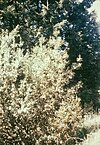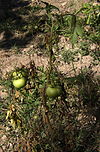
This article is a list of diseases of poinsettia (Euphorbia pulcherrima).
Bacterial diseases
Fungal diseases
This also includes oomycetes
Nematodes, parasitic
| Disease | Cause | Image |
|---|---|---|
| root-knot nematode | Meloidogyne spp. |
 |
Viral and viroid diseases
| Disease | Cause | Image |
|---|---|---|
| mosaic | Euphorbia mosaic virus | |
| mosaic | Poinsettia mosaic virus | |
| (symptomless) | Poinsettia latent virus |
Miscellaneous diseases and disorders
| Miscellaneous diseases and disorders | |
|---|---|
| Bleaching necrosis | Air pollutant injury from either chlorides (> 0.5 ppm), nitrogen dioxide (> 2-3 ppm) or sulfur dioxide (> 0.5 ppm) |
| Bract necrosis | Physiological disorder favored by high humidity, heavy watering and high (ammoniacal) fertility rates in the last 4 weeks of production |
| Chlorosis | Nitrogen deficiency producing a general foliar yellowing Molybdenum deficiency affecting mature young leaves and producing upward leaf roll |
| Cyathia drop | Response to low light conditions, dryness and/or high temperatures at the end of the production cycle |
| Dropping (epinasty) | Ethylene toxicity (< 1 ppm) or low temperature chilling |
| Edema | Physiological |
| Interveinal chlorosis | Magnesium deficiency, initiating on older leaves Manganese deficiency, initiating on young mature leaves |
| Latex eruption | High internal turgor pressure associated with certain cultivars, high humidity, high moisture availability, low temperatures and/or mechanical abrasion |
| Leaf glazing (bronzing) | Peroxyacetyl nitrate (PAN) injury to the lower epidermis
(> 0.2 ppm) |
| Marginal necrosis | Potassium deficiency
Fluoride toxicity on tips and margins of young leaves and bracts (0.4 ppm in water) |
| Stem splitting | Physiological expression of flower initiation |
| Stippling | Ozone injury (> 4 ppm) |
| Terminal shoot necrosis | Excessive soluble salts (> 800 EC X 102) |
| White bract | Chilling injury occurring between 0–10 °C (32–50 °F) |
References
- "Diseases of Poinsettia". Common Names of Diseases, The American Phytopathological Society]


























